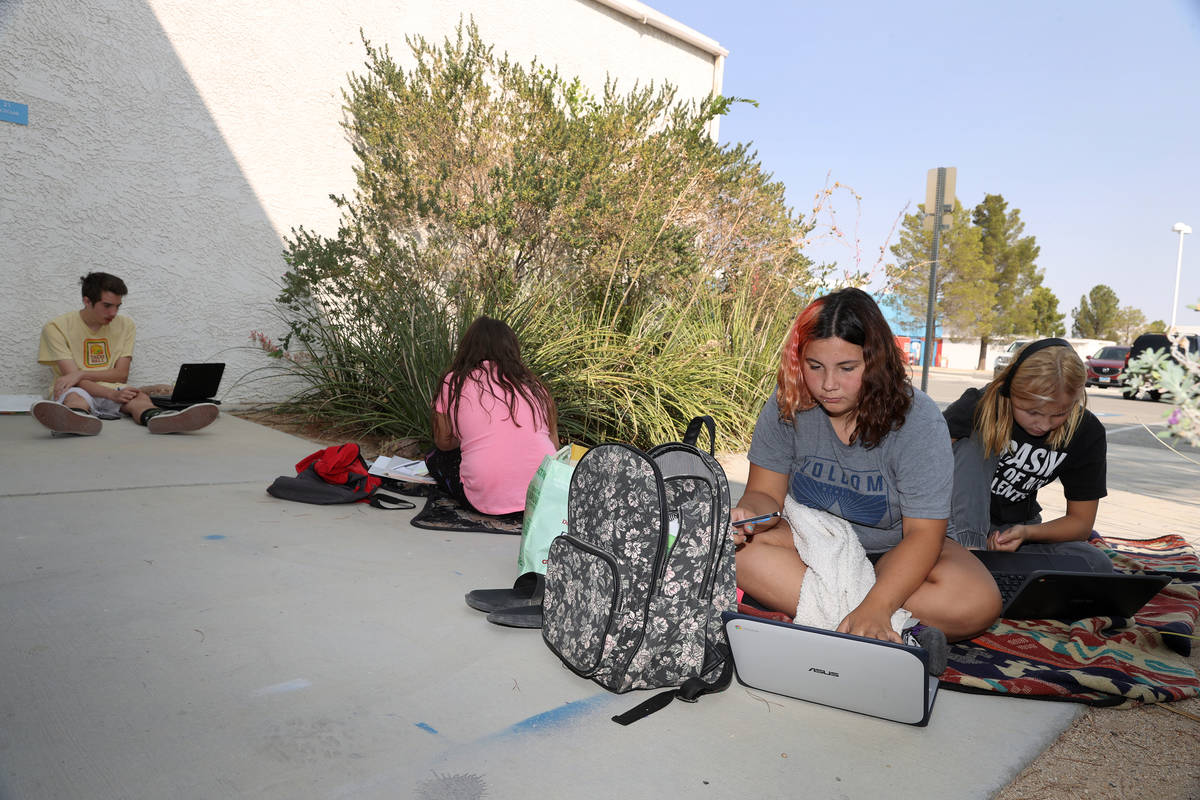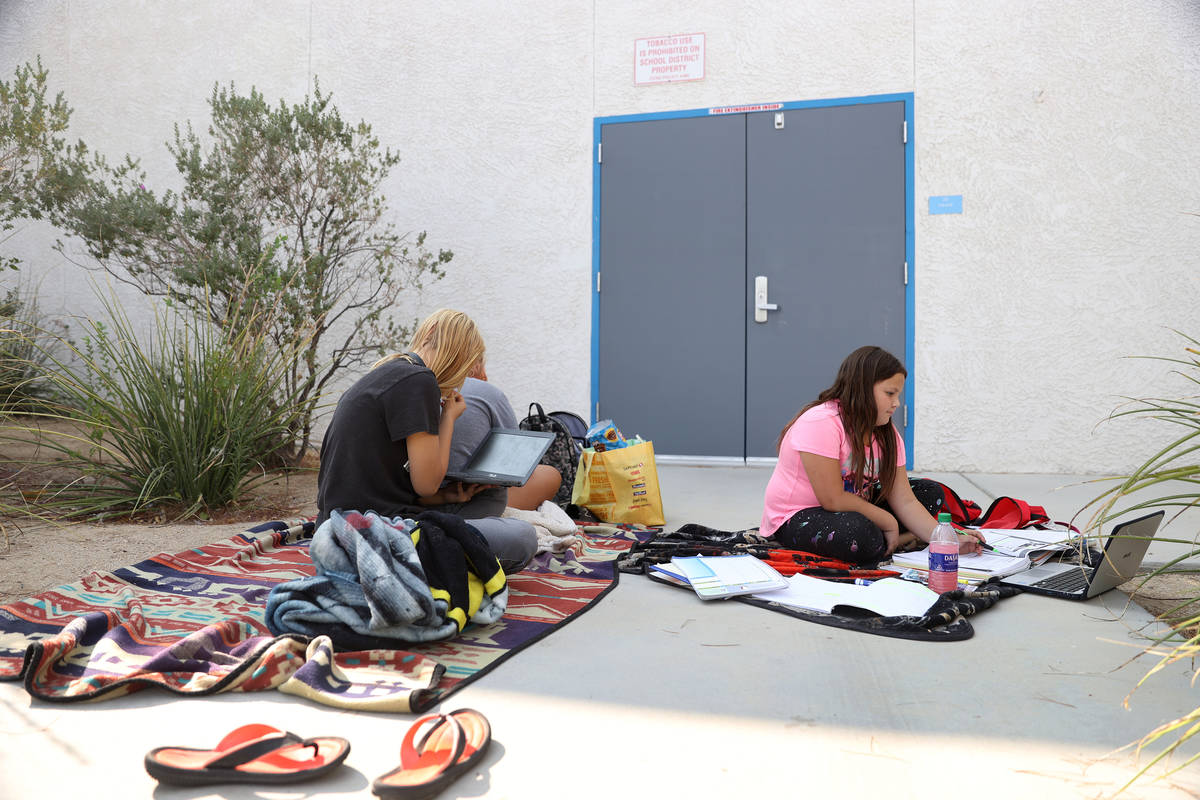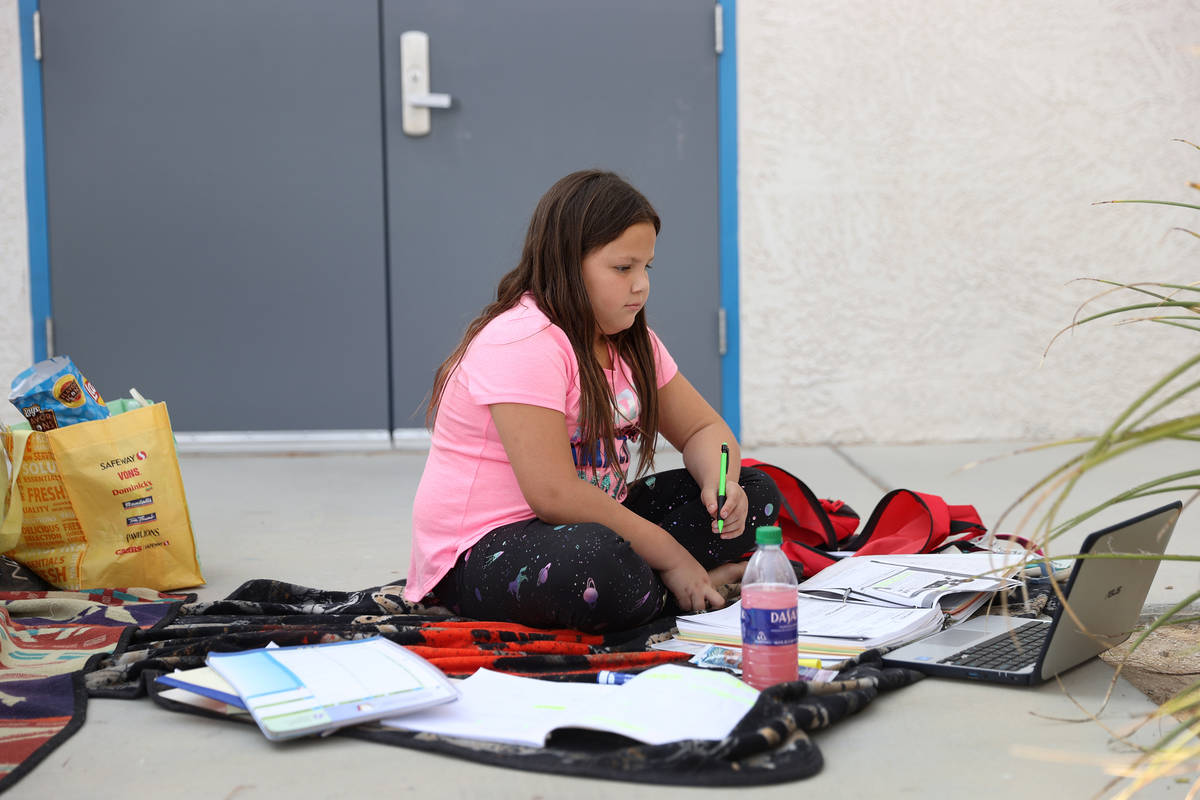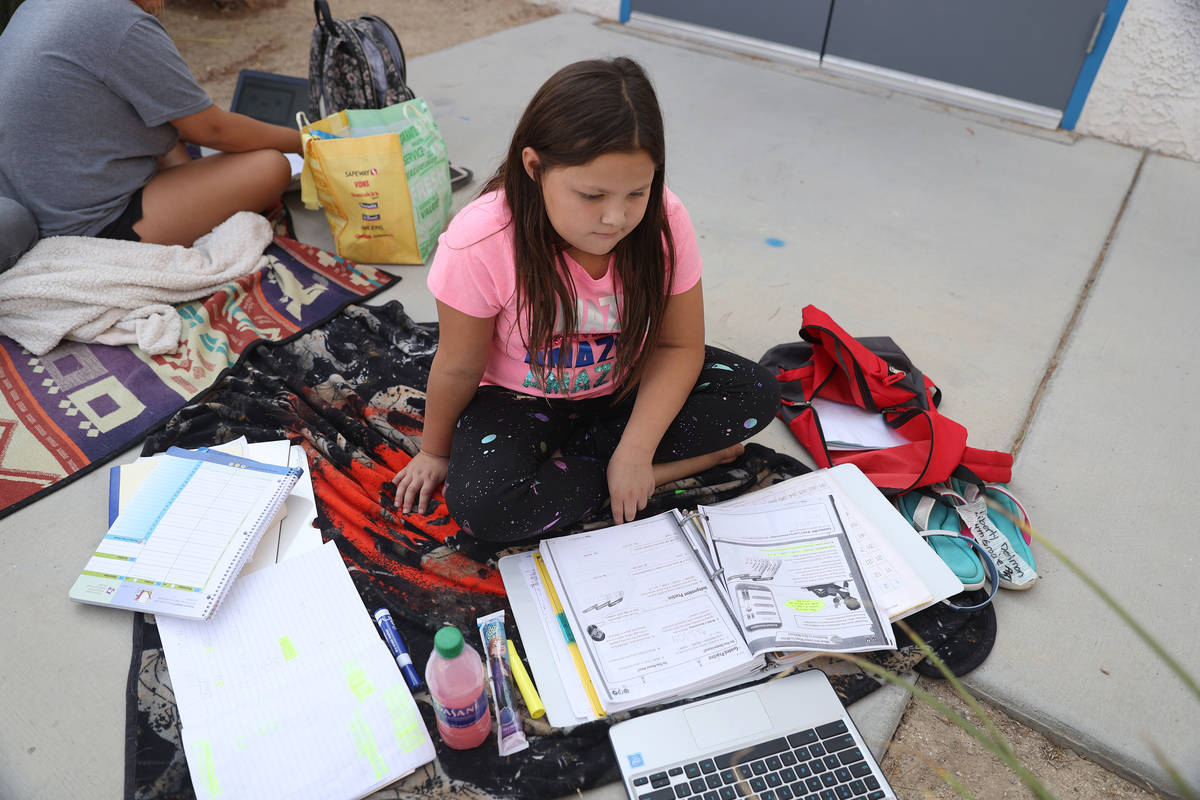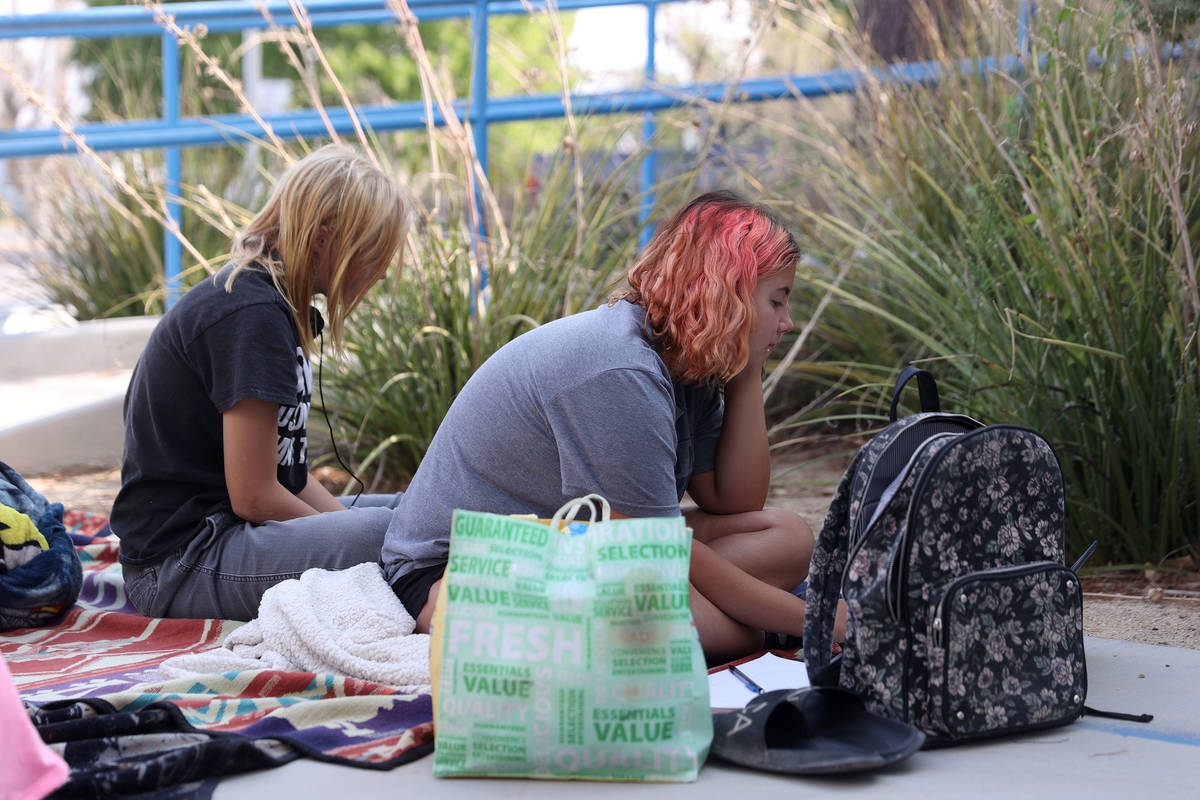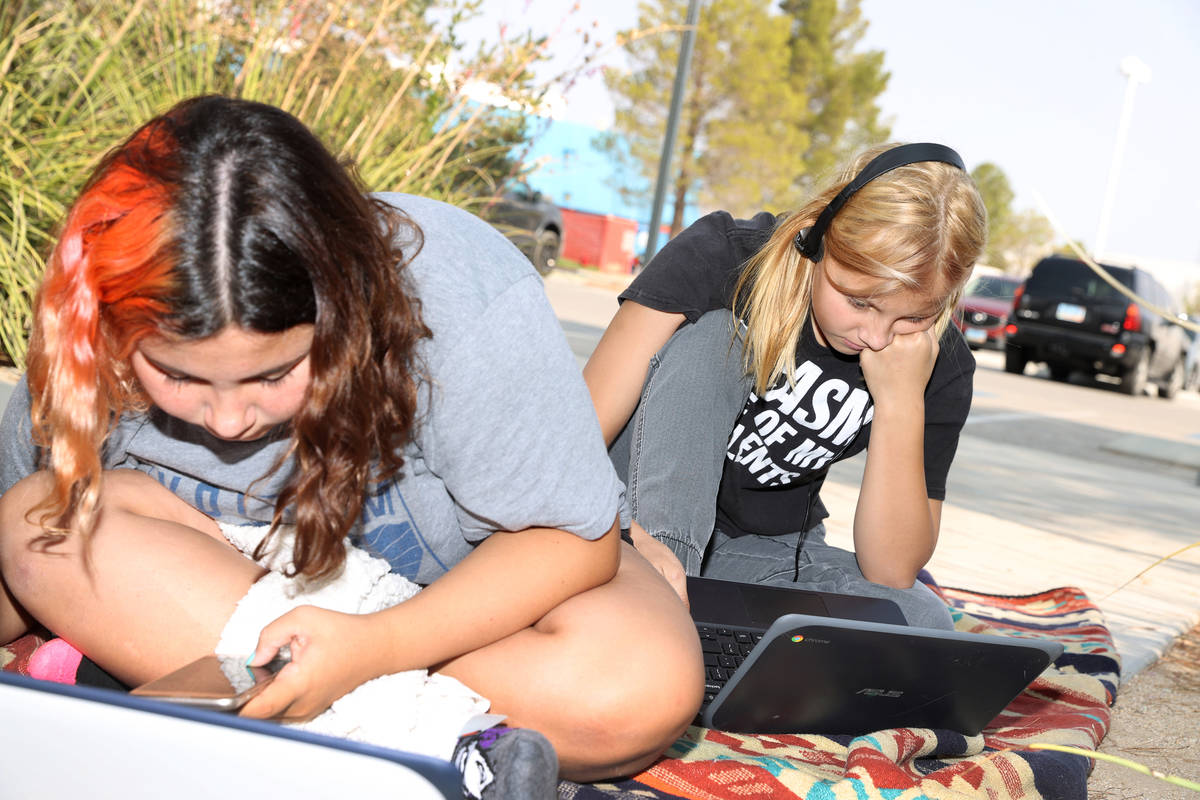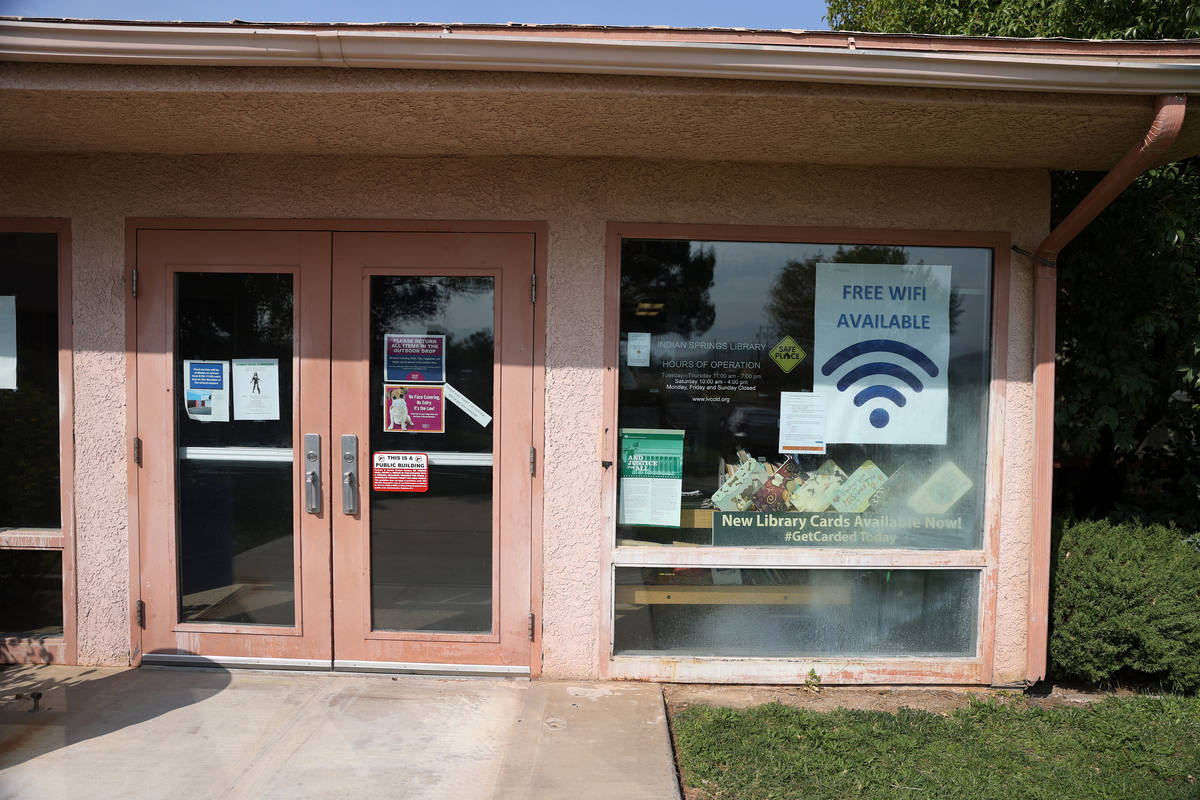In rural Nevada, tech challenges disrupt distance learning
Brandy Dedmon’s two teenagers spend their school days in Indian Springs sitting outside in 100-degree-plus temperatures because that’s the closest place they can pick up their school’s wireless internet signal.
The Dedmons are forced to endure such discomfort because they don’t have internet access at home in their rural community about 45 miles northwest of Las Vegas, next to Creech Air Force Base, and the mobile hot spots provided by their school provide only spotty connectivity.
That’s why a handful of children can be found most days sitting outside the library before it opens or near the Indian Springs Schools campus to find a more reliable wireless signal.
“Is anybody going to talk about these poor kids?” Brandy Dedmon wondered aloud on Monday. “They have to walk out here in the freakin’ heat.”
Indian Springs Schools, which has nearly 260 students in preschool through 12th grade, is part of the Clark County School District, which started the school year Aug. 24 with distance learning due to the COVID-19 pandemic.
Some, but not all, CCSD rural schools are open with at least some in-person instruction. Indian Springs Schools is operating under distance learning after school officials were unable to come up with a workable plan to provide both in-person and remote instruction.
“It’s been a struggle just to get the kids connected,” Principal Brian Wiseman acknowledged.
‘That would be a solution for us’
Wiseman said he put in a request Sept. 10 with the district seeking to open the school’s gymnasium to provide students with a cooler environment with access to the school’s wireless internet.
“I do think that would be a solution for us,” he said, adding the school’s Wi-Fi works “pretty well.”
It’s the second time Wiseman has sought to open the school gym. The first time was the week before school started, but he said he never received a response from CCSD.
If the request is approved this time, Wiseman plans to have as many as 50 tables inside the gym, with enough space to ensure social distancing. The school also will provide adult supervision using support staff — primarily campus security monitors — during the school day, he said.
District representatives said that district leaders are evaluating the request and are expected to reach a decision this week.
In the meantime, the school district said it has a three-tiered approach to help qualifying students get internet access and determines “which tier best applies based on geographic location.” The district said families in need of internet connectivity must contact the Family Support Center at 888-616-2476 for assistance in determining eligibility.
The first tier is Cox’s Connect2Compete, and if service isn’t available in a particular geographic area, the second tier is a T-Mobile hot spot. If T-Mobile coverage isn’t available, “a Kajeet hot spot will be assigned as the Kajeet hot spots can work with multiple mobile providers,” the district said.
Internet connectivity issues
There are a couple of internet options in Indian Springs through “companies you’ve never heard of,” but they’re “super expensive and not really reliable,” Wiseman said, adding Cox Communications doesn’t serve the community.
Indian Springs residents typically access the internet through their phones, Wiseman said. But during distance learning, many students are relying on school-provided mobile hot spots.
About 98 percent of Indian Springs students have been able to access distance learning at some point, but many are experiencing connectivity issues, he said. “The problem is it’s very spotty,” he said of the internet service.
Wiseman said he has observed classes and witnessed students losing connectivity during a live lesson and then having to log off and back on. And sometimes, their live video feeds froze.
“Most of the kids who live in Indian Springs are having trouble,” he said.
Wiseman said the district “actually did quite a bit to help us out” but noted there are things the school and district don’t have control over.
The district provided 120 mobile hot spots through T-Mobile, for instance, but the service “just doesn’t work” in Indian Springs, he said.
The school purchased 63 hot spots through Verizon in the spring. “We had some success through those,” Wiseman said, so CCSD provided about 80 more.
School officials have been working with Verizon representatives on options such as expanding signals or even repositioning a cellphone tower, Wiseman said.
Verizon spokeswoman Heidi Flato said in a Tuesday email that “our network team is making some adjustments to our local cell site, which may improve service in the area. However, we are not relocating a cell site.”
Indian Springs Library, a branch of the Las Vegas-Clark County Library District, provides Wi-Fi access but is only open from 11 a.m. to 7 p.m. Tuesdays through Thursdays and 10 a.m. to 4 p.m. on Saturdays.
“We’re limited on hours,” library associate Marie Elena Reed said.
But students can still pick up the internet signal from outside the building, even when the branch is closed. In the mornings, “they’re getting here before we’re getting in,” Reed said.
She said she has seen students a few times sitting in front of the library trying to get as much shade as they can or sitting on the side of the building. She said numbers vary, but she saw three children outside the library last week.
Sometimes, students get frustrated when they’re not able to log on from home, Reed said. “That’s usually when they come to us.”
She said she recently talked with a couple of students who showed up at the library and told her they already finished their schoolwork for the day because they couldn’t log on for their live classes. She said she reminded them the library has desktop computers and headsets available.
Reed said there’s a library Wi-Fi network specifically for students with web content filtering that allows them to use Google Meet. “Our internet service is quite reliable. I think it’s one of the fastest ones out here.”
The library also has five Sprint mobile hot spots patrons can check out for three weeks at a time, but there’s a waiting list. “It’s a high-demand item across the town,” Reed said.
The Las Vegas-Clark County Library District announced last week it’s offering student-only early opening hours at its 13 urban branches, which doesn’t include Indian Springs, from 7:30-10 a.m. Mondays through Fridays to support preschool through college students participating in distance learning. The offer includes free Wi-Fi access.
Connecting Kids Nevada, an effort by the Nevada COVID-19 Task Force to ensure students have a computing device and internet access during distance learning, said in a Tuesday news release that 96.6 percent of students in distance learning statewide have reliable internet access. Another 15,836 students have expressed a need for reliable internet connectivity, as of Sept. 9, it said.
“All qualified students in Indian Springs who request connectivity assistance are issued a Kajeet hot spot,” Punam Mathur, a spokeswoman for the group and executive director of the Elaine P. Wynn & Family Foundation, wrote in a statement. “Families living in the Clark County School District should call the Family Support Center — 888-616-2476 — or their school for help accessing subsidized connectivity or a device.”
Most rural schools holding in-person classes
Indian Springs Schools is one of the only rural CCSD schools that isn’t open with at least some in-person instruction. Four schools — Lundy Elementary, Perkins Elementary in Moapa, Reid Elementary in Searchlight and Goodsprings Elementary — have full-time in-person classes, while three schools in Moapa Valley are operating with a mix of in-person and remote instruction.
The challenge in Indian Springs was figuring out staffing in order to offer quality teaching both in person and online, Wiseman said. “It didn’t match up. We couldn’t do both.”
A couple of teachers weren’t comfortable with returning to school in person, he said, and results of a second community poll showed “a lot more parents who wanted online only than we thought.”
Wiseman said he put in a request, which he says was denied by CCSD, to offer full-time in-person classes for preschool through third grades, and distance education for fourth graders and older.
As for virus transmission in the rural community, fewer than five COVID-19 cases have been reported in Indian Springs’ 89018 ZIP code, according to the Southern Nevada Health District’s case-tracking website.
But doing distance learning without the technological backbone is not working, multiple parents told the Review Journal.
Indian Springs parent Jennifer Hickman, who has three children attending the school, in eighth, ninth and 10th grades, said distance learning in the community isn’t as simple as children logging on and getting what they need.
“This isn’t Vegas,” she said. “There isn’t multiple satellite services. It’s very, very frustrating to see your kids wanting to get the education and they can’t get it.”
The Hickman family has lived in Indian Springs for about 12 years. Hickman said she and her husband run a mobile home park in town and they’re a low-income family.
Hickman said her family was given two mobile hot spots by the school, but they don’t work. They’d never had home internet access until this summer, when they decided to pay for it since they knew the children would need it for distance learning. Now, they’re paying nearly $200 per month for satellite service through Viasat.
With home internet access, “They have their issues, but for the most part they can log on and take classes,” she said. Sometimes, her children lose connectivity, though, and it can take 10 to 15 minutes to get logged back on.
Hickman said her older son, a straight-A student, took two classes this summer to get ahead. He’s trying to graduate as valedictorian and with an advanced honors diploma. She said her children are extremely involved in school activities during a normal year.
During distance learning, “it’s very frustrating to see them struggle because I don’t feel they’re getting the education they deserve,” she said.
Indian Springs parent Casandra Salazar, who has an 8-year-old daughter in third grade and a 12-year-old son in seventh grade at the school, said she believes her kids are not receiving an adequate education: “Our kids are not getting the education we’re paying for with our taxes.”
Salazar, who described herself as a disabled stay-at-home mother, said she contacted multiple internet providers, but they don’t cover Indian Springs. Another company wanted $300 to set up service and then $170 per month, she said. “We can’t afford that,” she said.
Salazar said she’s using her own mobile hot spot to provide access for her children, and when that goes out, they go to her mother’s house, also in Indian Springs, to use her internet. She said she helps her mother pay the internet bill.
Salazar said her daughter is meticulous in her schoolwork and has “called herself a failure for something that’s not ever her fault” when Canvas, CCSD’s primary online learning platform, isn’t working and she can’t turn in an assignment. Her grades have dropped.
Her son has an Individualized Education Program (IEP) and Salazar said his recent progress report shows he’s failing his classes.
Salazar said she’s juggling monitoring her children’s distance education with traveling to frequent doctor’s appointments, and her husband, the family’s sole income provider, also has a lot of doctor’s appointments since he started having seizures.
As she talked Tuesday with the Review-Journal by phone, Salazar paused for a moment to collect herself. “It’s hard on us, especially when my kids can’t log on.”
Contact Julie Wootton-Greener at jgreener@reviewjournal.com or 702-387-2921. Follow @julieswootton on Twitter.
A previous version of this story included inaccurate information about how many Clark County School District rural campuses are utilizing distance education.



